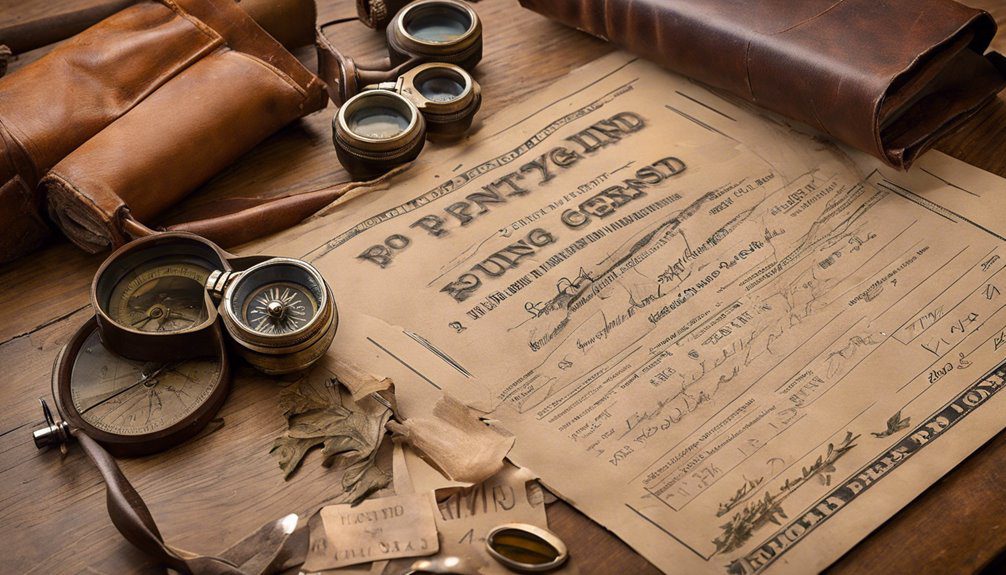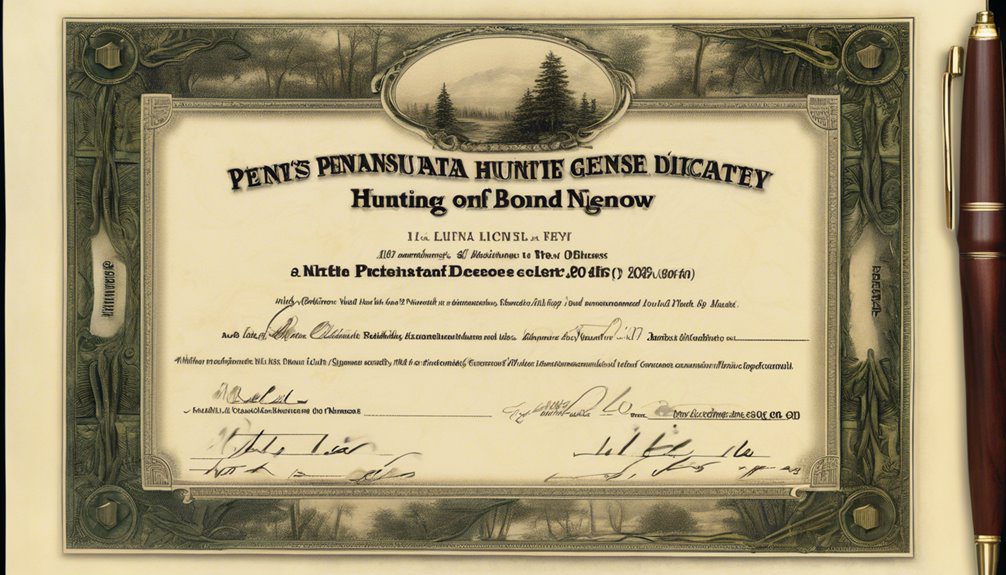If you're considering becoming a licensed hunting agent in Pennsylvania, understanding the Hunting License Agent Bond is essential. This $10,000 surety bond isn't just a formality; it plays a vital role in ensuring you comply with state regulations and protect yourself from potential liabilities. By securing this bond, you're not only enhancing your credibility but also safeguarding the interests of your clients. However, navigating the legal requirements and application process can be daunting. What challenges might you face in maintaining this bond, and how can you effectively manage them?
Overview of the Bond

When it comes to hunting in Pennsylvania, the Hunting License Agent Bond plays a crucial role. This bond ensures that you, as a hunting license agent, operate within the legal and ethical guidelines set by the state. It serves as a safety net, protecting both you and the state from potential financial losses that could arise from your mismanagement or unethical practices.
By obtaining this bond, you show your commitment to upholding the laws governing hunting licenses. It assures the state that you'll handle funds responsibly and fulfill your obligations to the public. If you fail to comply with these regulations, the bond provides a mechanism for compensation, allowing affected parties to recover their losses.
Furthermore, having this bond can enhance your credibility as an agent, instilling trust in your clients and the community. It demonstrates that you're serious about your role in promoting responsible hunting practices.
In short, the Hunting License Agent Bond is essential not just for compliance, but also for fostering a trustworthy relationship with hunters and the state alike. Understanding its significance can help you navigate your responsibilities effectively and maintain a positive standing in your community.
Legal Requirements
To operate as a hunting license agent in Pennsylvania, you must meet specific legal requirements set forth by the state.
First, you need to be at least 18 years old and possess a valid Pennsylvania driver's license or state-issued ID. This ensures you have a reliable form of identification.
Next, you must apply through the Pennsylvania Game Commission, which oversees licensing and permits. You'll also need to demonstrate that you're financially responsible by obtaining a surety bond. This bond acts as a safeguard for both the state and the public, ensuring that you fulfill your responsibilities as an agent.
Moreover, you have to comply with all local, state, and federal laws regarding hunting and wildlife management. This includes understanding regulations about the sale of licenses and the handling of sensitive information.
Application Process

The application process for becoming a hunting license agent in Pennsylvania is straightforward but requires careful attention to detail.
First, you need to fill out an application form, which you can find on the Pennsylvania Game Commission's website. Make sure to provide all requested information accurately, as incomplete applications can delay your approval.
Once you've completed the form, you'll need to gather supporting documents. This typically includes proof of your business location, identification, and any necessary licenses or permits.
Check the specific requirements based on your business type, as they may vary.
Next, submit your application along with the required documents to your local Game Commission office. It's a good idea to keep copies of everything you submit for your records.
After submission, you may have to wait for a processing period, during which the commission will review your application and conduct any necessary background checks.
Bond Amount and Costs
After submitting your application to become a hunting license agent in Pennsylvania, you'll need to consider the bond amount and associated costs. The bond amount typically required is $10,000. This bond acts as a financial guarantee that you'll comply with state regulations and fulfill your duties as an agent.
When it comes to costs, you'll pay a premium to secure this bond, which can vary based on several factors. Your personal credit score, the bonding company's policies, and the overall risk assessment will influence your premium. Generally, you can expect to pay anywhere from 1% to 10% of the total bond amount annually, depending on your financial history and the bonding agency.
It's also essential to factor in additional fees, such as application fees or any service charges from the bonding company. Additionally, understanding the importance of timely renewal of the bond is crucial to maintaining your compliance and avoiding penalties.
Make sure you shop around and compare prices from different providers to find the best deal that suits your budget. Knowing these costs upfront will help you plan your finances more effectively as you take the necessary steps to become a licensed hunting agent in Pennsylvania.
Benefits for Agents

As you embark on your journey to become a hunting license agent in Pennsylvania, you'll discover several benefits that can enhance your experience and success in this role.
First and foremost, you'll gain access to valuable training resources that can boost your knowledge about hunting regulations and licensing processes. This expertise not only increases your confidence but also equips you to assist customers effectively.
Moreover, being a license agent allows you to build strong relationships within your community. You'll connect with outdoor enthusiasts and establish a network of fellow agents and hunters, which can lead to referrals and increased business opportunities.
Additionally, you'll enjoy the satisfaction of supporting wildlife conservation efforts through the sale of licenses, knowing that your work contributes to the preservation of natural resources.
You might also appreciate the flexibility that comes with being a license agent. Whether you're running your own business or working within an established organization, you can often set your own hours and tailor your services to meet local needs.
Responsibilities of License Agents
While you enjoy the benefits of being a hunting license agent, it's crucial to understand your responsibilities in this role.
First and foremost, you must ensure that you're following all state regulations regarding licensing. This means staying updated on the rules and changes related to hunting licenses.
You'll need to accurately process license applications and payments, ensuring that all transactions are recorded properly. Keeping detailed records is essential, as you may be required to present them during audits or inspections.
It's your responsibility to maintain the confidentiality of your customers' information, treating their personal data with the utmost care.
Additionally, you should provide accurate information about hunting regulations and license requirements to your customers. This ensures they're well-informed and can enjoy their hunting experience without any legal issues.
You should also promote ethical hunting practices, encouraging conservation and respect for wildlife.
Lastly, it's vital to uphold a professional demeanor when interacting with customers. Your conduct reflects not only on you but also on the agency you represent.
Common Challenges

Navigating the role of a hunting license agent can be challenging, especially when dealing with common obstacles that arise in the process. One major challenge you might face is keeping up with regulatory changes. Laws and guidelines can shift, and staying informed is crucial to avoid penalties or misinformation.
Another issue is managing customer expectations. Hunters often have specific needs and timelines, and if you can't meet those, it can lead to frustration. You may also encounter difficulties with the licensing software or system, which can be confusing and prone to errors, resulting in delays for your clients.
Additionally, you'll need to handle the financial aspects, including securing and maintaining your bond. This can feel overwhelming, particularly if you face unexpected costs or claims. It is important to understand the types of surety bonds available, as they can provide financial assurance for your operations.
Lastly, you might experience pressure during peak hunting seasons when demand spikes. It's essential to develop strategies to cope with high volumes of applications while ensuring accuracy and efficiency.
Being prepared for these challenges can make your job as a hunting license agent smoother and more enjoyable, allowing you to better serve your clients and navigate the complexities of the role.
Renewal and Maintenance
To keep your role as a hunting license agent running smoothly, understanding the renewal and maintenance of your bond is essential. Your bond needs renewal periodically, usually every one to two years, depending on the terms set by your bonding company. It's crucial to keep track of the expiration date to avoid lapses in coverage.
When the time comes for renewal, you'll likely need to provide updated financial information and possibly undergo a re-evaluation. Make sure to gather any required documents well in advance to streamline the process. Staying proactive can help you avoid any delays.
Also, pay attention to any changes in your business operations that might affect your bond. If your financial situation changes or you expand your operations, it's wise to inform your bonding company immediately. They may require adjustments to your bond amount or terms.
Lastly, maintaining a clean record is vital. Any claims against your bond can impact your renewal terms and premiums. By staying informed and organized, you'll not only ensure compliance but also reinforce your reputation as a reliable hunting license agent. This diligence will ultimately benefit your business in the long run. Moreover, understanding the financial implications associated with your bond can help you make informed decisions regarding your operations and compliance.
Conclusion
In summary, obtaining a Pennsylvania Hunting License Agent Bond is essential for your operations as a licensed agent. It not only safeguards you against potential financial losses but also showcases your commitment to ethical practices. By understanding the legal requirements, application process, and your responsibilities, you can navigate challenges effectively. Stay proactive about renewal and compliance to maintain your credibility and trust in the community. With the right approach, you'll ensure a successful and compliant hunting license business.


